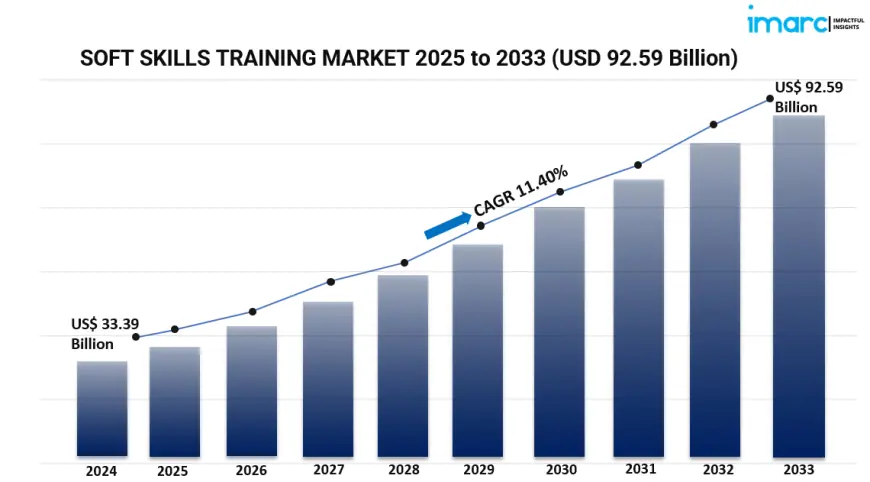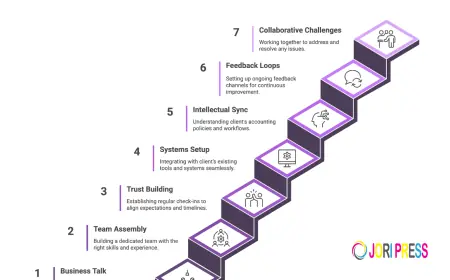Corporate Development and Workforce Enhancement Fueling Soft Skills Training Market

Market Overview
The global soft skills training market is experiencing significant growth, fueled by the increasing demand for capabilities such as communication, leadership, adaptability, and teamwork across various industries. In the era of automation and artificial intelligence (AI), human-centric competencies have become indispensable for career progression and organizational success. The market achieved a valuation of USD 33.39 Billion in 2024 and is expected to surge to USD 92.59 Billion by 2033, registering a robust CAGR of 11.40%. The primary growth drivers include corporate emphasis on workforce upskilling and the growing integration of e-learning technologies into professional development frameworks.
Study Assumption Years
-
Base Year: 2024
-
Historical Years: 2019-2024
-
Forecast Years: 2025-2033
Soft Skills Training Market Key Takeaways
-
The market size stood at USD 33.39 Billion in 2024 and is projected to reach USD 92.59 Billion by 2033, growing at a CAGR of 11.40% during 2025-2033.
-
North America led the market in 2024, contributing over 32.9% of the global share, driven by a strong corporate learning infrastructure.
-
The adoption of e-learning and virtual training tools is transforming training approaches for globally dispersed workforces.
-
Leadership and management development continues to be a priority for businesses aiming to enhance operational efficiency.
-
Globalization is driving investments in cross-cultural communication and collaboration training programs.
-
Technological advancements, including AI-driven learning platforms and VR simulations, are enhancing employee engagement and training effectiveness.
-
Remote and hybrid work environments are increasing the demand for digital collaboration and adaptability skills.
Request for a sample copy of this report: https://www.imarcgroup.com/soft-skills-training-market/requestsample
Market Growth Factors
Rising Workforce Development Demand
Across the globe, organizations are recognizing that fostering soft skills is essential rather than optional. Businesses are allocating substantial resources toward enhancing communication, leadership, teamwork, and problem-solving abilities to build resilient, high-performing teams. These skills contribute directly to increased productivity, employee retention, and a more cohesive workplace environment. Modern training initiatives are shifting away from exclusively technical learning, emphasizing instead the development of interpersonal competencies essential in today’s evolving business climate.
Technology-Enhanced Training Solutions
The rapid adoption of advanced technologies is revolutionizing soft skills training. AI-powered coaching platforms, scalable e-learning solutions, and immersive VR-based training environments are enabling more interactive and engaging learning experiences. Industry pioneers like UPS and Walmart are already incorporating VR to deliver experiential training that simulates real-world challenges. These advancements support the growing need for creativity, empathy, and complex problem-solving abilities—skills that automation cannot replicate.
Expansion of Remote and Hybrid Work Models
The acceleration of remote and hybrid work arrangements has increased the necessity for skills like virtual communication, time management, and adaptability. As organizations continue to embrace flexible working models, demand for specialized training tailored to digital workplaces is rising. With around 25% of jobs projected to be fully remote by 2030, companies are prioritizing the development of soft skills suited for virtual collaboration and productivity.
Market Segmentation
By Soft Skill Type
-
Management and Leadership: Enhances decision-making and team management.
-
Administration and Secretarial: Improves communication and operational support.
-
Communication and Productivity: Focuses on workplace interaction and performance.
-
Personal Development: Encompasses emotional intelligence, self-awareness, and growth.
-
Teamwork: Builds collaboration and interpersonal relationships.
-
Others: Covers negotiation, conflict resolution, and creative problem-solving.
By Channel Provider
-
Corporate/Enterprise: Customized programs for employee upskilling.
-
Academic/Education: Courses preparing students for professional careers.
-
Others: Industry-specific training providers.
By Sourcing
-
In-House: Conducted internally within organizations.
-
Outsourced: Delivered by external trainers or consultants.
By Delivery Mode
-
Online: Flexible, accessible digital training formats.
-
Offline: Traditional, instructor-led sessions.
-
Blended: Combination of online and in-person learning.
By End Use Industry
-
BFSI: Focuses on client engagement and communication.
-
Hospitality: Enhances customer service delivery.
-
Healthcare: Emphasizes teamwork and empathy in patient care.
-
Manufacturing: Supports collaboration and leadership in production.
-
IT and Telecom: Strengthens interpersonal and client-facing capabilities.
-
Education: Improves mentoring and communication among educators.
-
Retail: Boosts customer interaction and sales performance.
-
Media and Entertainment: Develops creativity, presentation, and storytelling skills.
-
Others: Includes logistics, transportation, and energy sectors.
Breakup by Region
-
North America (United States, Canada)
-
Asia Pacific (China, Japan, India, South Korea, Australia, Indonesia, Others)
-
Europe (Germany, France, United Kingdom, Italy, Spain, Russia, Others)
-
Latin America (Brazil, Mexico, Others)
-
Middle East and Africa
Regional Insights
North America led the global market in 2024, capturing over 32.9% of the total share. This dominance stems from well-established training ecosystems, the integration of AI-driven learning technologies, and strong corporate initiatives focused on employee development. The region remains a hub for leadership, communication, and performance-driven training programs.
Recent Developments & News
The soft skills training industry is witnessing significant technological innovation, particularly with the adoption of VR-powered learning solutions. Companies such as UPS, Walmart, and Volvo Group are utilizing virtual reality simulations to provide employees with practical training scenarios that enhance empathy, customer service, and decision-making. Moreover, global collaborations between public and private entities are being established to expand access to advanced workforce development initiatives worldwide.
Key Players
-
Articulate Global Inc.
-
Cengage Learning Inc.
-
Computer Generated Solutions Inc.
-
D2L Corporation
-
edX Inc.
-
New Horizons Worldwide LLC
-
NIIT Limited
-
Pearson PLC
-
QA Limited
-
Skillsoft Corporation
If you require any specific information that is not covered currently within the scope of the report, we will provide the same as a part of the customization.
Ask Analyst for Customization: https://www.imarcgroup.com/request?type=report&id=2598&flag=C
About Us:
IMARC Group is a global management consulting firm that helps the world’s most ambitious changemakers to create a lasting impact. The company provides a comprehensive suite of market entry and expansion services. IMARC offerings include thorough market assessment, feasibility studies, company incorporation assistance, factory setup support, regulatory approvals and licensing navigation, branding, marketing and sales strategies, competitive landscape and benchmarking analyses, pricing and cost research, and procurement research.
What's Your Reaction?
 Like
0
Like
0
 Dislike
0
Dislike
0
 Love
0
Love
0
 Funny
0
Funny
0
 Angry
0
Angry
0
 Sad
0
Sad
0
 Wow
0
Wow
0

















































